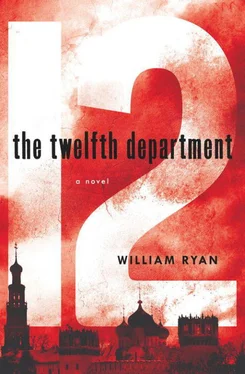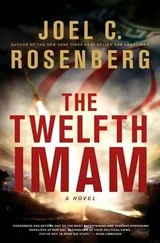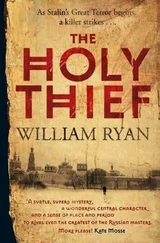“We’ll just look around,” Dubinkin said. “We’re expecting to meet someone here. All the paperwork’s gone already, I take it.”
“Paperwork, Comrade? We haven’t seen any paperwork—it must have been your lads did that. There were some of them packing up their own trucks when we arrived.”
“Excellent. Remind me which warehouse you’re driving to at the moment—we have two up there. We may have to make a change.”
Danilov gave him the address and then Dubinkin delicately questioned the man without seeming to. As it turned out, the location of the warehouse was the only useful piece of information he had.
* * *
They left Danilov to his work and walked farther down the corridor, opening the door to what had once been Azarov’s office. Their footsteps echoed on more bare floorboards. Everything had been taken from the room, except a portrait of Stalin. He looked down at them benevolently.
“This is where I met Shtange,” Korolev said. “His desk was just there.”
Dubinkin walked to the window, looking out as a truck’s engine started.
“Where do you think they’re taking everything?” Korolev asked him. “After the warehouse. And what about the people who worked here—where have they gone?”
“Somewhere we’re not meant to find them, I suspect. Although we’ll do our best, of course. I suspect Colonel Zaitsev was concerned that the security of the institute’s work might have been compromised.”
Dubinkin spoke in a resigned monotone that told Korolev the Chekist considered any hope of locating the missing institute forlorn at best.
“But there’s an investigation going on into the death of two men. Surely Colonel Rodinov can just order Zaitsev to take us to the people we want to talk to.”
Dubinkin made a noise that might have been a laugh if there’d been any humor in it.
“The only person who might be able to order Zaitsev about is Ezhov. And even then, it might have to go higher. Zaitsev’s an important man and dealing with him is a delicate business—I can’t say any more than that.”
Korolev looked around him, thinking that if an entire institute could disappear, just like that, with no explanation required—then where did that leave a Militia detective?
They walked through the building, from offices to meeting rooms, from operating rooms down deserted corridors to what looked like hospital wards, storage rooms, a canteen. Everywhere was empty or being emptied.
“What do you make of these?” Korolev asked, gesturing toward a metal door. He’d noticed that each area was divided from those adjoining it by two sets of metal doors, each with eyeholes and locks so that moving from one side to another would require both sides to cooperate.
“I imagine they segregated each area,” Dubinkin said. “That way no one knew everything that was going on. Almost like a cell structure, so that infiltration or treachery could only have a limited effect. And perhaps to make sure information wasn’t shared—that people only saw what was in front of them and never the bigger picture.”
“Yes,” Korolev said. “Shtange said something similar. That only the professor had known everything that went on in the institute.”
They walked out into the courtyard, standing silent among the busy workers, none of whom paid them much attention. Men were loading one truck with small metal bed frames.
“I understand the professor didn’t restrict his research solely to adults,” Dubinkin said.
Korolev said nothing, his attention drawn by the two long concrete buildings he’d seen on his first visit. They looked like massive bunkers more than anything else. Thick iron shutters were bolted into the walls where windows should be.
“Shall we have a look?”
They walked over and Dubinkin pushed at the massive door of the nearest of the two buildings. To Korolev’s surprise, it swung inward smoothly, only the slightest sound coming from its oiled hinges. The Chekist ran a finger along the edge of the door with what seemed to be admiration—it had been heavily sound-proofed with felt on the inside, even though it was already a good six inches thick.
“I’ve seen this kind of sound-proofing before.”
So had Korolev—he’d made a brief unwilling visit to the Lubyanka the year before and seen just the same felt applied to some of the doors. And when Dubinkin found the electricity switch, he recognized the circular metal light shades that ran along the narrow central passage. It was cool inside the building but, then again, unless he was wrong, it was a place where the sun had never shone.
Korolev said nothing as he followed the Chekist past the heavy cell doors that lined each side of the corridor. All of them were open.
“Look in here,” Dubinkin said, peering into one.
The room was as dark as a pit. There was nothing in it—not a bed, nor a basin, nor a chair. Not even a bucket for a man’s necessary activities. The walls were painted black—as was the floor. Korolev looked round for a light fitting inside the cell. But there was none to be found.
“Put a man in here for a few days and he’ll tell you whatever you want him to,” Dubinkin said, and to judge from his voice, his view of such measures wasn’t necessarily negative. “But he won’t like you for it. Or ever be the same, I shouldn’t think.”
The next three cells were identical—but the fifth was a complete contrast. Here the walls and the floor were painted a glossy white and its high ceiling, ten feet up, was thick glass. Korolev flicked a switch and the room lit up like the inside of a light bulb.
“I wonder what they did about the heat—from the lights,” Dubinkin said.
Always the pragmatist, Korolev thought to himself.
“I don’t think they cared much about the poor devils’ comfort,” he said. “There’s not even a bench for them to lie on, let alone a cot.”
“Yes, I wondered about that. And do you see, in this cell there’s an eyehole. Not in the other ones—probably no point, given they’d have been pitch-black.”
They went through the entire building—there were some cells no bigger than a standing coffin, while others had the same dimensions as the others they’d seen, except that the ceiling was so low a prisoner would have to crawl around on his hands and knees. In the basement there were cells that were really sealed swimming pools, with the entry point in the roof and metric measurements on the wall—calibrated to the centimeter. By the time they’d finished their inspection, Korolev was profoundly depressed.
“What do you make of it?” Dubinkin asked.
“I make nothing of it,” Korolev said. “I’ve seen nothing.”
He looked along the corridor—they’d cleaned the place up, but there was still that smell of urine, sweat, and fear—the acrid tang of a prison.
“It does make you wonder though.” Dubinkin sounded contemplative, as if an interesting thought had occurred to him. “If they’d wanted to keep us out of here, they could have. Easily. We’d have needed a tank to get through that door if it had been locked. So why was it left open?”
A message, perhaps? Aimed at a Militia detective exhausted past the point of knowing what it was intended to mean? No, that wasn’t right. He knew what it meant all right. It meant keep your damned nose out of our business, Korolev, or face the consequences. He took one last look at the consequences and walked back out into the heat of the sun.
Korolev’s legs felt tired as he climbed the stairs to Shtange’s apartment, but his soul felt wearier still. His visit to the institute had him asking questions he generally tried to avoid. What kind of revolution had it been now that the State had ended up making a science out of breaking its citizens down and building them up again? And for what? So that they could all think the same, feel the same, chant the same name at the same time—Stalin’s name, no doubt. How had it happened? He’d thought the Revolution had been intended to give the people freedom from oppression, not build establishments like the institute. Sometimes it was hard to believe that there was any good left in Soviet power, and that was the truth of it.
Читать дальше












